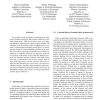100
Voted
IAT
2005
IEEE
15 years 6 months ago
2005
IEEE
The BDI agent model comprises a simple but efficient folk psychological framework of mentalistic notions usable for modeling rational agent behaviour. Nevertheless, despite its u...
118
Voted
IAT
2005
IEEE
15 years 6 months ago
2005
IEEE
Partially observable Markov decision process (POMDP) is commonly used to model a stochastic environment with unobservable states for supporting optimal decision making. Computing ...
99
Voted
IAT
2005
IEEE
15 years 6 months ago
2005
IEEE
This paper describes an agent-based recommendation system developed to support knowledge acquisition and sharing processes. Its purpose is to aid the process of community building...
65
Voted
IAT
2005
IEEE
15 years 6 months ago
2005
IEEE
90
Voted
IAT
2005
IEEE
15 years 6 months ago
2005
IEEE
Our previous research presents a methodology of cooperative problem solving for BDI systems, based on a complete formal theory. This covers both a static part, defining individua...
73
Voted
IAT
2005
IEEE
15 years 6 months ago
2005
IEEE
Being able to trust in a system behavior is of prime importance, particularly within the context of critical applications as embedded or real-time systems. We want to ensure that ...
97
Voted
IAT
2005
IEEE
15 years 6 months ago
2005
IEEE
Multiagent Bayesian networks (MABNs) are a powerful new framework for uncertainty management in a distributed environment. In a MABN, a collective joint probability distribution i...
98
Voted
IAT
2005
IEEE
15 years 6 months ago
2005
IEEE
Choosing when to communicate is a fundamental problem in multi-agent systems. This problem becomes particularly hard when communication is constrained and each agent has different...
113
Voted
IAT
2005
IEEE
15 years 6 months ago
2005
IEEE
Cooperative negotiation is proved to be an effective paradigm to solve complex dynamic multi-objective problems in which each objective is associated to an agent. When the multi-o...
78
Voted
IAT
2005
IEEE
15 years 6 months ago
2005
IEEE
This paper proposes a middleware based on the multi-agent paradigm. Our proposition enables agents to locate and to interact easily with heterogeneous services and information pro...

